For addiction treatment centers, ranking high on Google is essential for connecting with individuals seeking help. A well-planned drug rehab SEO strategy ensures your facility appears when potential clients search for treatment options.
The foundation of this success lies in effective keyword research—identifying the SEO keywords people use to find rehab services. This guide will walk you through finding and implementing the best terms to improve visibility, drive traffic, and increase admissions for your center.
Understanding the Role of Keywords in Drug Rehab SEO

What Are SEO Keywords?
Keywords are the foundation of any SEO strategy, serving as the bridge between potential clients and your rehab facility. When someone types a query into search engines, they are looking for specific treatment options or information related to drug addiction treatment, alcohol addiction treatment, or mental health support. The right keywords ensure that your site appears in search results, increasing search visibility and driving traffic to your rehab center.
There are high-intent keywords and low-intent keywords. High-intent terms indicate readiness to take action, such as “best inpatient drug rehab near me” or “opioid addiction treatment center accepting Medicaid”. Low-intent searches are more exploratory, such as “what are the symptoms of alcohol withdrawal” or “how long does it take to detox from heroin”. While both types have value, focusing on rehab SEO keywords with strong intent can significantly improve admissions.
Why Keywords Matter for Addiction Treatment Centers
Choosing the right keywords directly impacts a center’s online visibility, making it easier for drug addicts, their family members, and individuals struggling with substance abuse to find recovery resources. The best Google ads and organic strategies work by matching popular search terms with specific services.
By carefully selecting target keywords, addiction treatment centers can improve search engine results, ensuring their business ranks above competitors. For example, a rehab facility optimizing for “alcohol rehab centers in Texas” or “drug and alcohol treatment programs near me” is more likely to attract clients actively searching for treatment programs.
Additionally, search trends show that people often search for drug treatment using a mobile-friendly website. Ensuring a mobile-friendly experience helps capture more clicks from those searching on their phones.
Types of Keywords for Rehab SEO
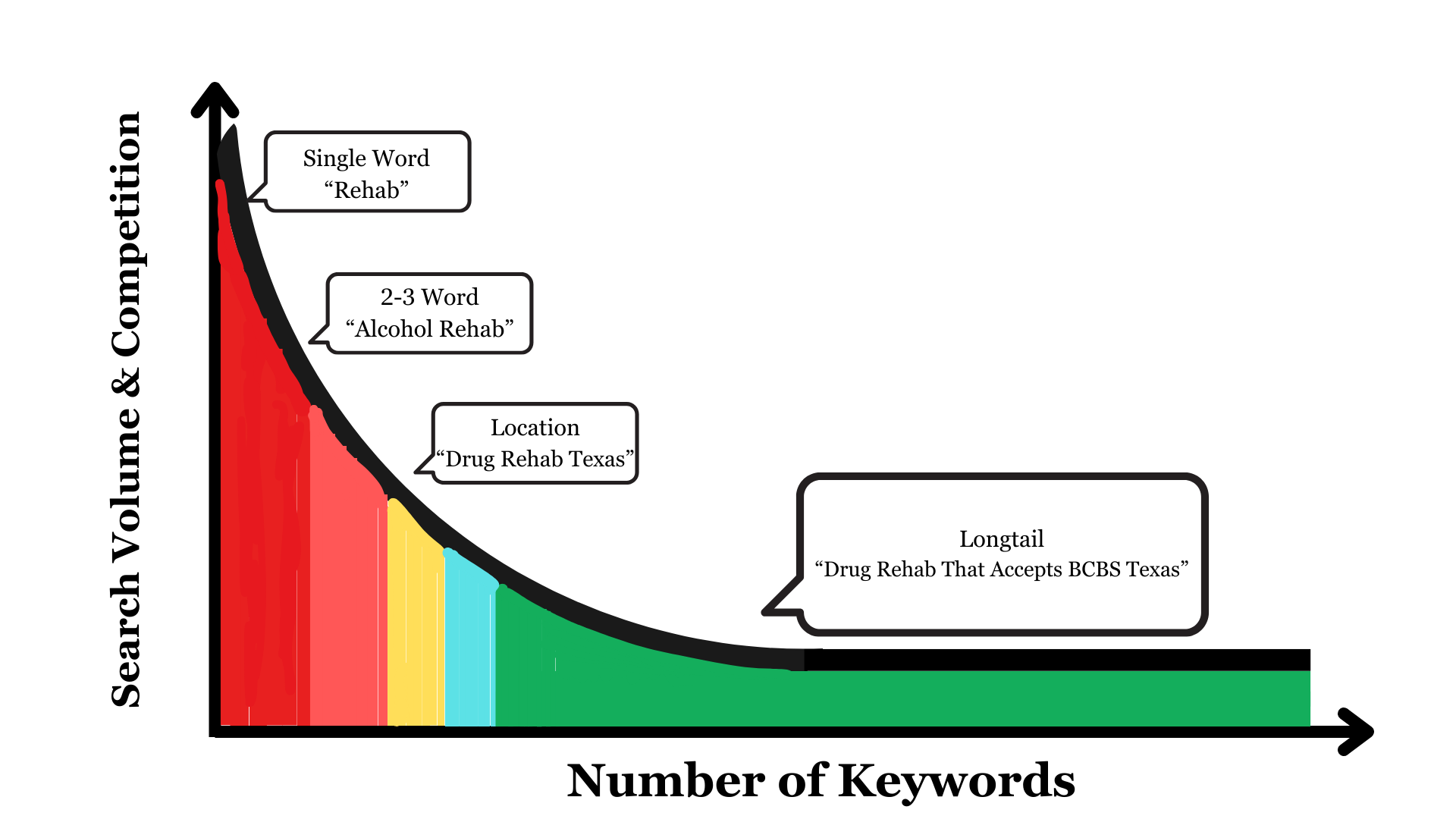
Short-Tail vs. Long-Tail Keywords
- Short-tail keywords (e.g., “drug rehab”) have high search volume but are extremely competitive.
- Long-tail keywords (e.g., “affordable alcohol rehab for veterans in California”) are more specific and easier to rank for.
- A well-balanced keyword list should include both for optimal search results.
Informational vs. Transactional Keywords
- Informational keywords (e.g., “how to stop alcohol abuse”) attract visitors seeking guidance.
- Transactional keywords (e.g., “opioid addiction treatment near me”) attract those ready to enroll in treatment programs.
- Conduct keyword research using tools like Google Keyword Planner to ensure a balance of both.
Branded Keywords
- These include Google Ads keywords related to your rehab facility, such as “RadiX Recovery reviews” or “best alcohol rehab in Arizona”.
- Ranking for branded terms enhances credibility and captures more people searching for your services.
Local Keywords
- Local SEO is crucial for rehab centers, as most clients look for addiction treatments within a specific area.
- Examples: “best drug rehabilitation center in New York”, “alcohol rehab centers in Florida”.
- Optimizing for Google Ads, Google My Business, and local directories increases search engine results for treatment programs.
By strategically implementing these rehab SEO keywords, your business can improve effectiveness, capture more clicks, and ensure your site reaches the target audience seeking recovery.
Step-by-Step Guide to Finding the Right Drug Rehab Keywords

Step 1 – Identifying Search Intent
Understanding search intent is crucial in keyword strategy because it determines what type of content will attract the target audience and convert potential clients into admissions. There are three primary categories of search intent:
- Informational Intent: Users conducting keyword research at this stage are looking for answers about drug rehabilitation, withdrawal symptoms, and treatment options. Queries may include “How long does drug detox take?” or “Signs of alcohol addiction.”
- Transactional Intent: These are high-conversion phrases indicating readiness for treatment programs. Examples include “best drug rehab near me” or “opioid addiction treatment accepting insurance.”
- Navigational Intent: These searches involve people who already know a rehab center and want details, such as “ABC Recovery reviews” or “alcohol rehab in Los Angeles phone number.”
Aligning Content Strategy with Search Intent
To effectively capture clients, content should be mapped to intent:
- Blogs should focus on informational intent and educate people about substance abuse and treatment.
- Service pages should be optimized for transactional intent, including clear CTAs for drug treatment admissions.
- FAQs should directly answer addiction treatment keywords to improve search engines rankings and credibility.
Step 2 – Using Keyword Research Tools
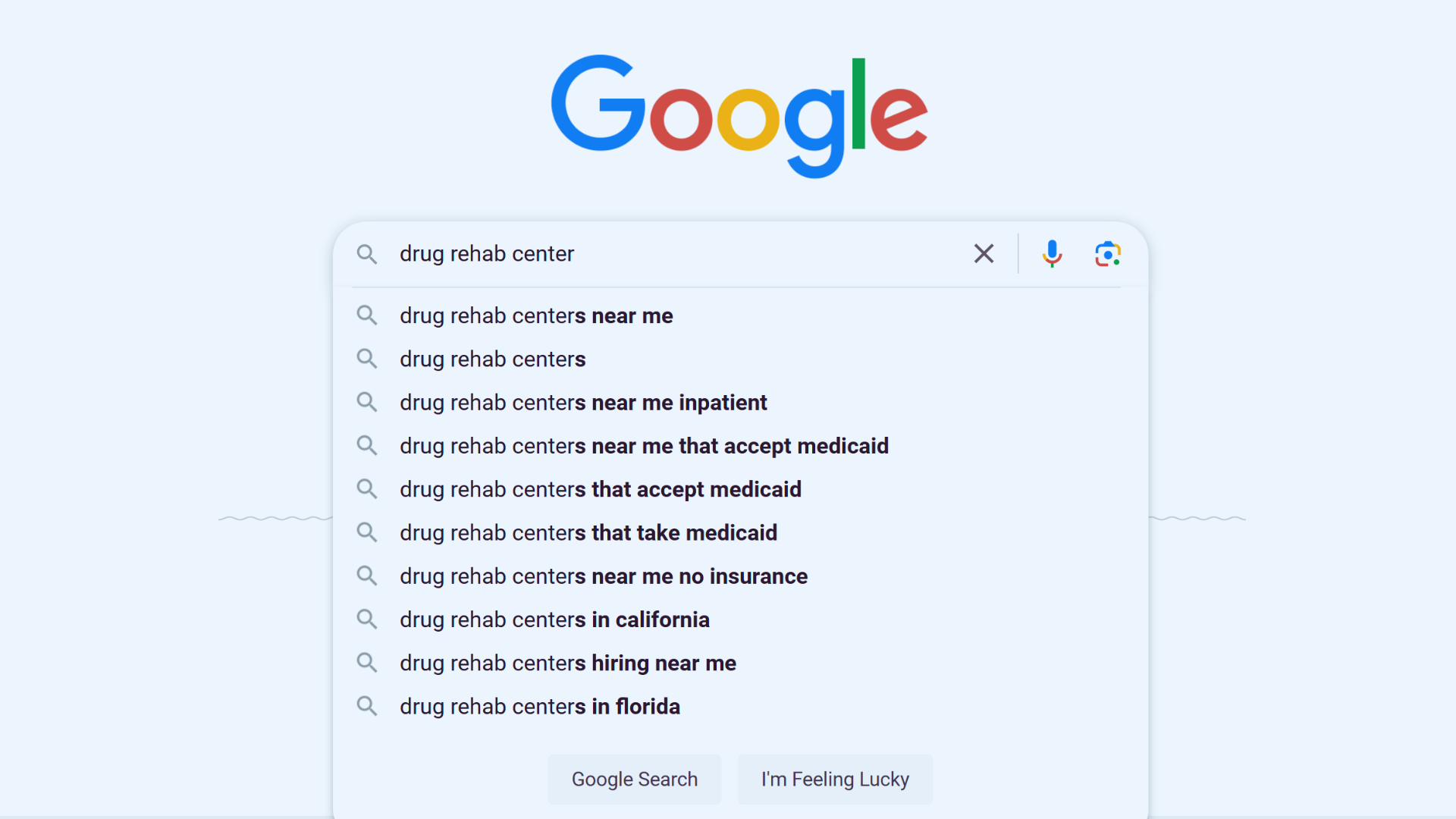
Free Tools for Finding Keywords
- Google Keyword Planner: This Google Ads tool helps rehab facilities identify relevant keywords based on search volume and competition.
- Google Autocomplete: By typing in a query, google suggests high-volume search terms related to alcohol addiction treatment and drug addiction treatment.
- People Also Ask & Related Searches: These sections highlight tens of thousands of additional ideas that drug treatment seekers are searching for.
Budget-Friendly Paid Tools
- Ubersuggest: Offers insights into target keywords, helping alcohol treatment centers find opportunities with lower competition.
- AnswerThePublic: Generates keyword research questions based on real searches related to addiction treatments and drug rehab.
Advanced SEO Tools for Competitive Research
- SEMrush: Helps analyze competitor sites, revealing high-ranking pages and target keywords that bring in traffic.
- Ahrefs: Identifies backlink opportunities and addresses ranking gaps for business growth in drug and alcohol treatment services.
Analyzing Competitors for High-Value Keyword Opportunities

Why Competitor Research is Essential
Successful addiction treatment centers that dominate search engines have already identified the most effective phrases that attract drug rehabilitation clients. By studying their strategies, you can uncover keyword research opportunities they leverage to maintain high rankings. Analyzing their content structure, backlink profiles, and keyword placement can provide valuable insights into what works and what gaps exist in their site.
Many rehab centers fail to address critical aspects of opioid addiction treatment or alcohol addiction treatment, leaving opportunities to develop more informative and engaging content. Identifying these gaps allows your drug rehab to create better-targeted treatment programs that attract the right audience.
How to Analyze Competitor Keywords
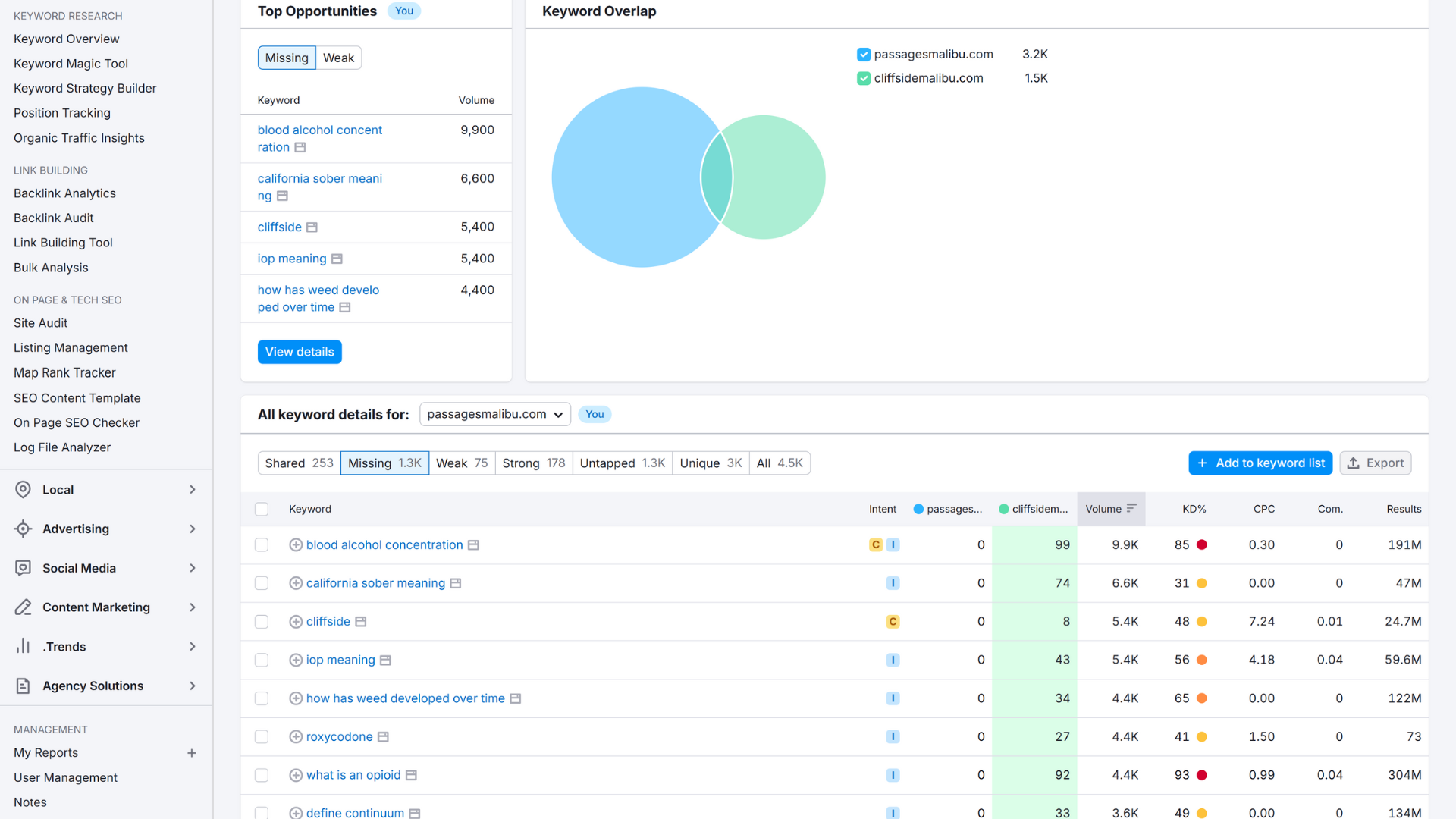
Using Ahrefs/SEMrush to Track Competitor Rankings
Advanced tools like Ahrefs and SEMrush allow you to analyze which drug addiction treatment keywords competitors rank for and how much traffic their website receives. These tools also reveal the addresses of the most authoritative backlinks supporting their rankings. This data helps refine your SEO strategy by showing which pages attract the most visitors.
Manually Reviewing Competitor Websites
While automated tools provide valuable insights, manually analyzing competitor sites uncovers additional opportunities. Examine their page titles, meta descriptions, and service pages to identify alcohol rehab and drug addiction keywords they prioritize. Studying their treatment descriptions and recovery stories can also highlight what services resonate most with users.
Finding Content Gaps and Creating Better Pages
If a competitor lacks in-depth information on alcohol addiction or fails to cover the full scope of addiction treatments, it presents an opportunity to develop superior content. Creating detailed treatment programs for specific substances and addressing underserved topics will position your rehab as a more authoritative resource in the drug and alcohol recovery space.
Optimizing Your Website with Rehab SEO Keywords
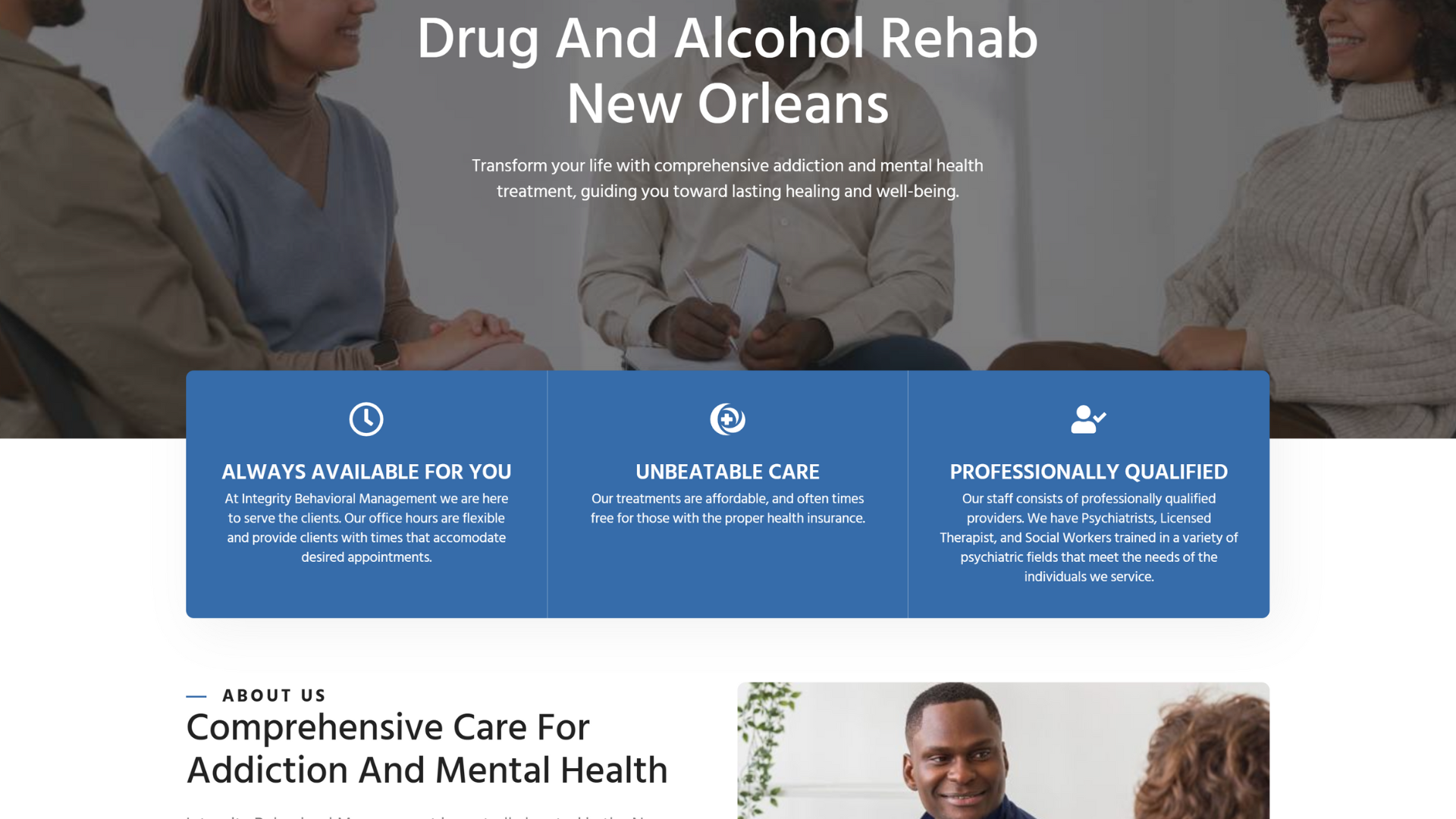
Where to Place Keywords for Maximum Impact
Strategic keyword placement ensures addiction treatment centers improve their visibility and attract the right audience. Optimizing various elements of a website helps search engines understand its relevance while keeping content natural and engaging.
Title Tags & Meta Descriptions
Title tags serve as the first impression of a rehab center in search results. They should include terms related to drug rehab and alcohol addiction treatment while remaining concise. Meta descriptions, which provide a preview of the page content, should summarize key points and encourage clicks.
H1, H2, H3 Headings & Subheadings
Proper heading structures help organize content and improve readability. Using targeted terms related to drug addiction treatment in headers signals the focus of each section, helping search engines categorize and rank the content.
Body Content & Blog Posts
Placing drug addiction and addiction treatments naturally within blog posts and service descriptions ensures a website remains informative without appearing over-optimized. Well-researched content should align with search intent while offering value to readers.
Image Alt Text & URL Structure
Alt text enhances accessibility and allows search engines to index images related to recovery. URLs should be clear and descriptive, incorporating relevant terms that reflect the treatment provided.
Internal Linking for SEO Growth
Internal links guide users through a rehab center website, directing them from informative blog content to treatment service pages. Linking related posts and structuring navigation menus effectively strengthens SEO and enhances user experience.
Common Keyword Research Mistakes to Avoid
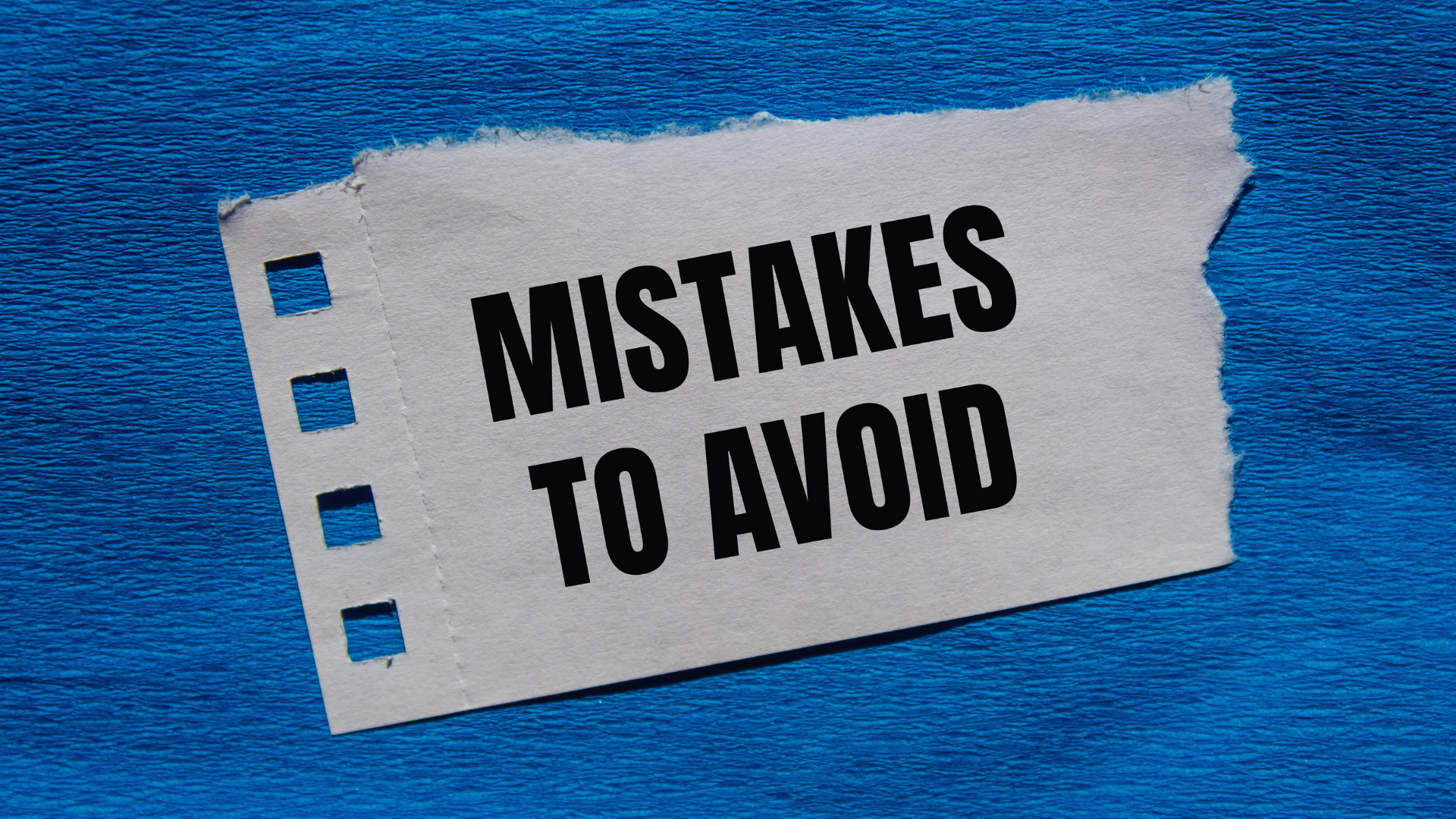
Keyword Stuffing
Overloading a website with excessive keywords can damage rankings instead of improving them. Search engines prioritize readability and user experience, so unnaturally forcing terms like drug rehab or alcohol addiction treatment can result in penalties. Instead, keywords should be placed naturally within high-quality, informative content that serves potential clients.
Ignoring Long-Tail Keywords
Many addiction treatment centers focus on broad terms, overlooking more specific phrases that potential clients use when seeking recovery. Long-tail keywords—such as affordable drug addiction treatment for veterans—face less competition and attract individuals closer to making a decision. These targeted phrases increase engagement and improve conversion rates.
Neglecting Local SEO
Many rehab centers fail to optimize for location-based searches, reducing visibility for individuals searching for treatment nearby. SEO strategies should incorporate geo-targeted terms while enhancing Google My Business profiles, ensuring people seeking addiction treatments in their area can easily find relevant services.
Apply to Work With Our Expert Drug Rehab SEO Agency
At Behavioral Health Partners, we specialize in helping addiction treatment centers expand their reach and connect with those seeking recovery. Our expertise in SEO ensures that your drug rehab center ranks for the right searches, bringing in clients who need your treatment services.
We partner with alcohol addiction treatment and drug rehab programs dedicated to excellence, helping them build a powerful website that attracts and converts visitors. If your center is committed to making a real impact, we’re here to help you reach more people and change lives. Apply today to work with our expert SEO team.

